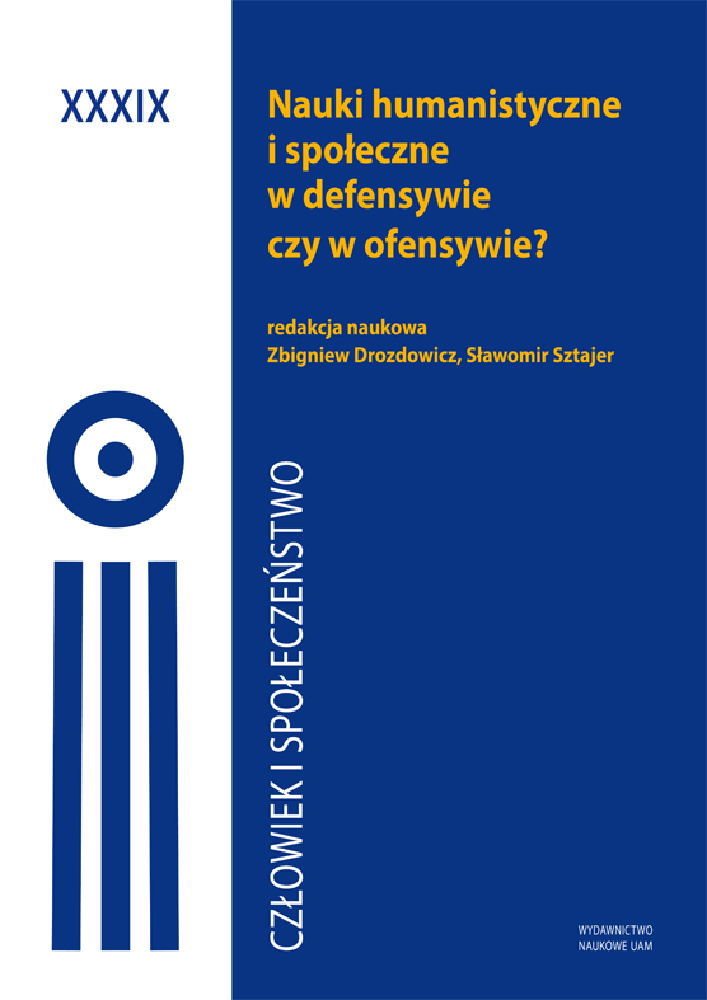Abstract
This article is the first Polish presentation of the project of expert philosophy, perceived as a non-academic response to the contemporary crisis of humanities. In the field of metaphilosophy and methodology, expert philosophy tries to cooperate fruitfully with science and market, coming across fundamental research of economy and management studies. Refering to the Sophistic movement, it wants to return to the practical dimension of logic and philosophical ethics. Its crucial issue is how to describe expert knowledge, what is reflected in the didactics.
References
Dreyfus H.L., Dreyfus S.E., Mind Over Machine: The Power of Human Intuition and Expertise in the Era of the Computer, The Free Press, New York 1986.
Filipowicz G., Zarządzanie kompetencjami – perspektywa firmowa i osobista, Wolters Kluwer Polska, Kraków 2014.
Jemielniak D., Kobus M., Ekonomia daru i społeczności otwartej współpracy – nowe kierunki badań społecznych, „E-mentor” 4(56)/2014.
Jemielniak D., Kociatkiewicz J., Knowledge Management: Fad or Enduring Organizational Concept?, w: D. Jemielniak, J. Kociatkiewicz (red.), Handbook of Research on Knowledge – Intensive Organizations, IGI Global Press, Hershey – New York 2008.
Kodeks etyczny Stowarzyszenia Sprzętu Komputerowego oraz Karta Praw i Obowiązków Dydaktyki Elektronicznej: http://mumelab01.amu.edu.pl/Wprowadzenie-HTML/KO-09-01.html [30.12.2014].
Nonaka I., Takeuchi H., The Knowledge-creating Company: How Japanese Companies Create the Dynamics of Innovation, Oxford University Press, Oxford 1995.
Oleksyn T., Zarządzanie kompetencjami teoria i praktyka, Oficyna Ekonomiczna, Kraków 2006.
Polanyi M., The Tacit Dimension, University of Chicago Press, Chicago 1966.
Reuter M., Kognitywistyczne ujęcia konfabulacji: podejście pamięciowe vs. epistemiczne, „Studia z Kognitywistyki i Filozofii Umysłu” 1(6)/2012.
Ryle G., Knowing How and Knowing That, „Proceedings of the Aristotelian Society” 46/1945-1946.
http://mumelab01.amu.edu.pl/Wprowadzenie-HTML/KO-09-01.html [30.12.2014].
http://syjon-1.umcs.lublin.pl/metacortex/show/0/31446 [30.12.2014].
http://tadeuszbartos.pl/03/index.html [30.12.2014].
License
1. W momencie złożenia pracy celem rozpoczęcia postępowania w sprawie publikacji, Licencjodawca, zwany dalej Autorem, akceptuje wszystkie zasady umieszczone na stronie internetowej czasopisma “Człowiek i Społeczeństwo”, udzielając Licencjobiorcy, zwanego dalej Wydawcą, niewyłącznej i nieodpłatnej licencji na korzystanie z Utworu. Licencja zakłada tym samym brak ograniczeń terytorialnych, czasowych oraz ilościowych na następujących polach eksploatacji (art. 50 ustawy z dnia 4 lutego 1994 r. o prawie autorskim i prawach pokrewnych):
a. utrwalanie Utworu;
b. zwielokrotnienie Utworu drukiem i w wersji cyfrowej;
c. wprowadzenie do obrotu, użyczenie lub najem oryginału/zwielokrotnionych egzemplarzy Utworu;
d. publiczne wykonanie, wystawienie, wyświetlenie, odtworzenie oraz nadawanie i reemitowanie, a także publiczne udostępnianie Utworu w taki sposób, aby każdy mógł mieć do niego dostęp w miejscu i w czasie przez siebie wybranym;
e. włączenie Utworu w skład utworu zbiorowego;
f. wprowadzenie Utworu w postaci elektronicznej na platformy elektroniczne lub inne wprowadzenie Utworu w postaci elektronicznej do Internetu, Intranetu, Extranetu lub innej sieci;
g. rozpowszechnianie Utworu w wersji elektronicznej w Internecie, Intranecie, Extranecie lub innej sieci, w pracy zbiorowej, a także samodzielnie w formule Open Access w oparciu o licencję Creative Commons Uznanie autorstwa 4.0 Międzynarodowa Licencja Publiczna (CC BY 4.0), a także inną wersję językową tej licencji, lub którąkolwiek późniejszą wersję tej licencji.
2. Założenia licencji Creative Commons Uznanie autorstwa 4.0 Międzynarodowa Licencja Publiczna (CC BY 4.0), udzielają Wydawcy upoważnienia do kopiowania, zmieniania, rozprowadzania, przedstawiania i wykonywania Utworu jedynie pod warunkiem uznania autorstwa.
3. Wraz z dostarczeniem Utworu, Autor zobowiązuje się do wypełnienia, podpisania oraz odesłania skanu umowy
